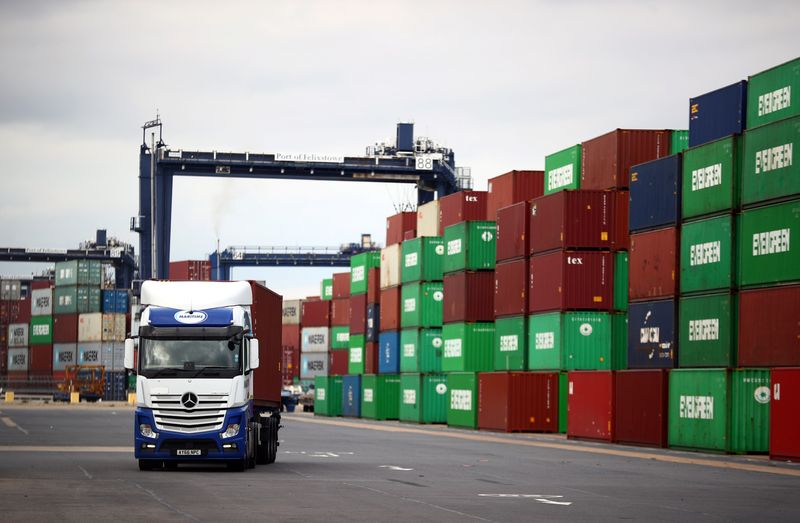By Shaloo Shrivastava
BENGALURU (Reuters) - U.S. President-elect Donald Trump will impose a tariff of less than 10% on UK imports next year or none at all, which will have an insignificant effect on the UK economy, according to a strong majority of economists polled by Reuters.
Those expectations stand in contrast to widespread fears that the European Union, which Britain officially left in 2020, will be harder-hit, according to a similar poll last month.
Part of the reason economists are more optimistic about the country is that while one-fifth of total UK trade is with the United States only a third of Britain's exports are goods - where the proposed tariffs will be focused.
While Trump is focused on correcting U.S. trade deficits with other countries, differing methodologies of their respective statistics agencies mean Britain and the U.S. both report goods trade surpluses with the other.
However, the European Union remains the UK's biggest trading partner and London has a delicate challenge in both mending frayed relations with Brussels and remaining open to deals with a new government in Washington.
"Without the broader complexities of the EU trading bloc, the UK will be somewhat more flexible in reaching a negotiated settlement with President Trump. It also helps that trade in goods with the U.S. is roughly balanced, meaning the tariffs may end up being lower," noted James Rossiter at TD Securities.
More than 80% of economists, 19 of 23, expect the U.S. to put a tariff of less than 10% or zero on UK imports despite talk of a blanket 10-20% tariff on all countries and higher tariffs on China, Canada and Mexico. Four said zero.
Only four forecast a 10-20% tariff.
A similar proportion of economists, 20 of 25, said the tariff will have an insignificant impact on the British economy, good news for Prime Minister Keir Starmer's government which has pledged to boost growth. Four said significant, while one said no impact.
"The UK is relatively well positioned to withstand the repercussions of President-elect Donald Trump's proposed trade tariffs," said Stefan Koopman at Rabobank.
"Surely, as an open economy, the UK will inevitably feel the impact of a trade war, but likely to a lesser extent than countries that are heavily-dependent on manufacturing and goods exports, such as Germany."
BoE Monetary Policy Committee member Megan Greene said last week it was too early to tell what impact tariffs would have on the UK economy or others.
"None of us know exactly what those tariffs might look like. We can't even work out which direction tariffs would push inflation, in particular in the UK and also in the euro zone to some degree," Greene said.
British inflation jumped to 2.3% in October after plunging to 1.7% in September, prompting the BoE to stick to a cautious approach and ease interest rates slowly but steadily.
All 71 economists polled Dec. 6-11 predicted the BoE to hold Bank Rate at 4.75% on Dec. 19. Median forecasts showed the BoE would cut Bank Rate by 25 basis points each quarter next year, lowering it to 3.75% by end-2025.

Around 54% of economists who had forecasts to end-2025, 36 of 67, expected 100 basis points of cuts by year-end. Another 17 expected cuts of 125 bps or more and 14 said 75 bps or less.
(Other stories from the Reuters global economic poll)